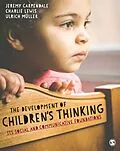The Development of Children's Thinking offers undergraduate and graduate students in psychology and other disciplines an introduction to several core areas of developmental psychology. It examines recent empirical research within the context of longstanding theoretical debates. In particular, it shows how a grasp of classic theories within developmental psychology is vital for a grasp of new areas of research such as cognitive neuroscience that have impacted on our understanding of how children develop.
The focus of this book will be on infancy and childhood, and it looks at:
- Theories and context of development
- How developmental psychology attempts to reconcile influences of nature and nurture
- Communication in infancy as a precursor to later thinking
- Language development in primates and young children
- Cognitive and social development, including the child's understanding of the mind
- How studies of moral reasoning reflect upon our understanding of development
Autorentext
Jeremy Carpendale
Jeremy I. M. Carpendale is Professor of Developmental Psychology at Simon Fraser University, Canada. He has published in the areas of cognitive, social cognitive, and moral development. His work focuses on the nature and development of thinking about social and moral matters and the role of language and social interaction in such development. He is author of How Children Develop Social Understanding (2006 with C. Lewis). He is an editor of several books, including Social Life and Social Knowledge: Toward a Process Account of Development (2008 with U. Müller, N. Budwig, & B. Sokol), The Cambridge Companion to Piaget (2009 with U. Müller & L. Smith), and Self- and Social-Regulation: Social interaction and the development of social understanding and executive functions (2010 with B. Sokol, U. Müller, A. Young, & G. Iarocci).
Inhalt
Chapter 1: Introduction: What is Human Thinking and How Does it Develop?
Chapter 2: The Role of Biology in Psychological Development
Chapter 3: Constructivist Approaches to Childrens Thinking
Chapter 4: Sociocultural Approaches to Childrens Thinking
Chapter 5: The Development of Communication and Social Understanding in Infancy
Chapter 6: Theories of Communication and Social Understanding in Infancy
Chapter 7: Animal Communication and Human Language
Chapter 8: Language in Human Communication and Thinking
Chapter 9: How Children Learn the Meaning of Words
Chapter 10: How Children Come to Control Their Behaviour
Chapter 11: Understanding the Social World
Chapter 12: Social Interaction, Language and Social Understanding
Chapter 13: Moral Reasoning and Action
Chapter 14: Recent Issues in Moral Development
